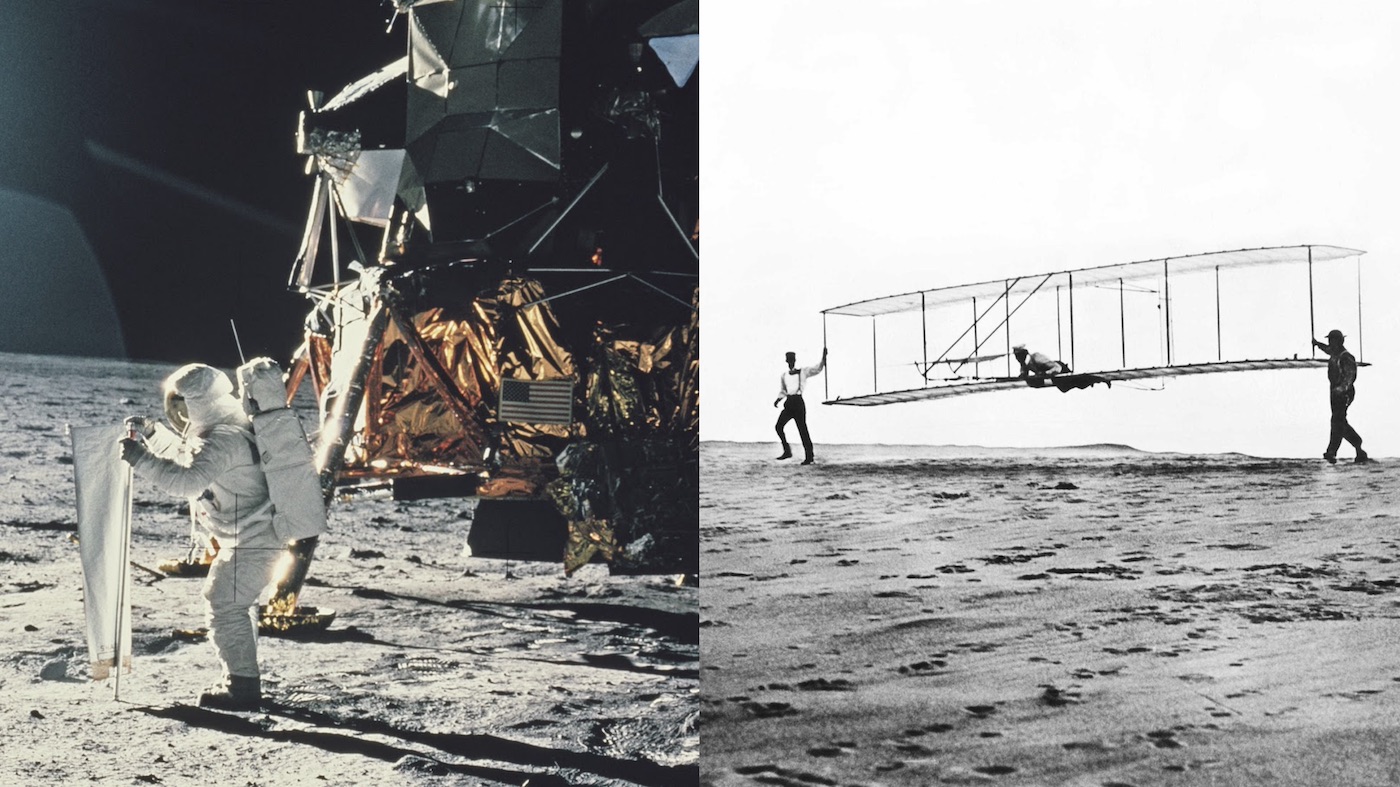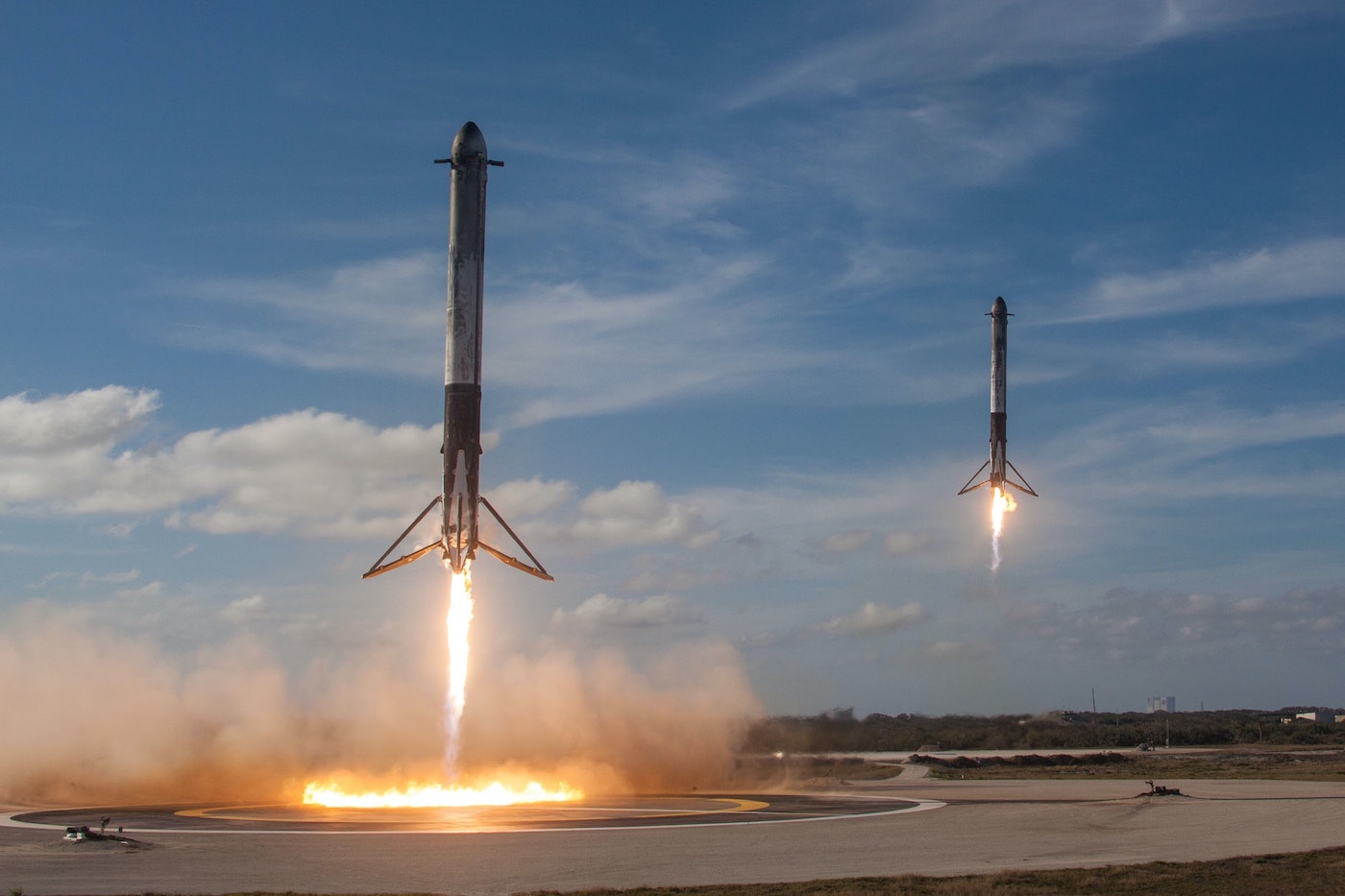Do we have the right mindset to tackle the really hard problems? Humanity has always progressed in leaps. And our ability to continue to do so depends on our desire to keep trying. Yet, something strange has happened. The West in particular seems to have quietly lost interest in solving the grandest of challenges. I don't buy the hysteria of “the robots are taking our jobs”. I actually worry it's the other way around. That technological progress has slowed down and we find ourselves trapped in stasis. This runs counter to the popular belief in ever-increasing and inevitable technological progress. I'll argue we have a progress problem and need a new mindset.

Speed matters
In 2019 we celebrated the 50th anniversary of the original human moon landing in 1969. Back then, the USA was in an intense space race against the USSR. The USSR was first in space with a satellite, first in space with animals, first on the moon with a probe, first man and woman in space, first spacewalk, and first remote-controlled rover on another celestial body. The US was painfully behind and had to go big or go home. As President John F. Kennedy proclaimed in 1961, NASA's charter was to put a man on the moon and bring him back safely within the decade. Importantly, JFK stressed that the US had to do this, “not because it is easy, but because it is hard.”
While the original moon landing is an incredibly important technological and cultural achievement, our 50th anniversary also illustrates a deeply disturbing fact; we haven't been back since!
The real issue seems to be a deceleration of transportation speed. The speed with which we move around has actually decreased since the original moon landing. As profound as it sounds, the evidence is clear. The Wright Brothers took flight in 1903. Two bicycle mechanics tinkered and experimented and failed until they didn't. The aeroplane ushered in a new era of human transportation speed and capacity. And with it an explosion of innovation. From biplanes to jet planes, from helicopters to rockets. The world has never been the same. In less than 70 years from not being able to fly, we left Earth. This is profound technological compounding.
Yet, since the last Apollo mission in 1972 this compounding effect seems to have stopped. The 50th anniversary of the moon landings was not just a nostalgic celebration. It was a painful reminder of how little we've progressed since. In the 1970s we also got the Concorde, capable of supersonic flight. Flying commercially from London to New York in less than 3 hours. But today the Concorde is no more and our existing commercial airplanes have actually slowed down.
Or consider the car. Today's cars are much more capable than in 1969. They're faster, safer, and more comfortable. Some can even drive themselves (almost, maybe, sometimes). Yet, because we have so many more cars on the roads, the entire system slows down to a crawl. Your car may be faster, but your transport is not. We simply have not innovated at the system level. Road traffic is fundamentally a geometric problem that can't be solved with simply inventing faster cars. Unless we innovate on the geometric problem we will be stuck at 20th-century capacity.
Every successful civilization mastered transportation. Transportation is such a fundamental human challenge that empires have been built around their ability to move people and goods effectively. From the Roman Empire's road system ("All roads lead to Rome") to the American Interstate Highway System (another really hard problem of the mid-20th century). There's a direct link between efficient transportation and increased GDP. Now ask yourself why the Belt and Road Initiative is so important to China. This in turn is another reason why cities are so successful. Their layout and density have increased effective transportation speed due to shorter travel distances. Like the elevator. People don't crowd together because it's comfortable but because it's useful.
If we aim to succeed in the 21st-century and beyond, we must be able to increase our transportation speed and innovate in our physical world. Actually, the vast majority of really hard problems exist in the physical world. Think about energy, vaccines, manufacturing, aerospace, shipping, construction, pharmaceuticals, and so on. To succeed we need a new mindset.
A new mindset
To fully understand what happened and how we got here is beyond this essay. Lots of smart thinkers have tried to answer that question. Economist Tyler Cowen has reflected on the loss of dynamism in his book The Complacent Class and blog post State Capacity Libertarianism. Tyler Cowen and Patrick Collison have even argued we need a New Science of Progress to better understand what propels us forward. Peter Thiel has long argued that most VCs have actually stopped taking risks and that transportation speed is a key impediment for progress. Marc Andreessen has argued we've stopped building. Regardless of how we got here, we do have a problem.
I believe one of the biggest factors here is our current mindset. Collectively, as a Western culture and especially liberal societies, we have lost our appetite for risk. We've become too comfortable for hard work. We've become too indifferent to the big adventure. We have to reignite our yearning for a brighter future. When you start pulling on this thread a lot of unfortunate truths unravel. For example, our media diet of movies and TV shows is overwhelmingly negative about the future. In the news cycle the world is always ending. And on social media we seem engulfed in endless rage. Change is always hard, but especially so if you think the Terminator is coming for your job. We need a counter-narrative. A realistic and forward-looking depiction of the future grounded in the wonders of science, exploration, and technological progress.
We have three tenets in front of us.
1. Individual and collective action
Do it yourself. Make small changes that add up to something bigger. The ethos of the environmentalists: save on your energy, recycle your trash, and buy your produce locally. This mindset offloads the responsibility for progress onto the individual. Sure, we're all responsible. But even if every Western eco-conscious consumer adopted all the “best practices” there's another billion people in China and India just trying to survive. While noble in principle, it's just not enough. We can't build a ladder to the moon.
2. State capacity
The world's governments will blaze the path. Or so we thought. The US used to provide this through institutions like the National Science Foundation, Lawrence Livermore Lab, NASA, DARPA to name a few. These institutions pushed The Endless Frontier. Laying the groundwork for countless startups to come. Yet, this only works if the supporting governments are led by scientifically and technologically literate politicians and administrators. Today, this seems to be a mirage. Solving really hard problems requires prolonged, multi-decade investments which are now both politically risky and institutionally blasé. Big government devoid of big ideas.
3. Entrepreneurship
That leaves us with private enterprise and entrepreneurship. The iconic Bell Labs, the former R&D arm of AT&T, seeded the early satellite, microchip, fiber optics, cellphones and much of the digital infrastructure we all take for granted. Today, we have proof that ambitious entrepreneurs can go after frontier technologies usually reserved for governments. Areas as far reaching as genetics, nuclear reactor design, universal computers, private space stations, autonomous vehicles, humanoid robots, defense systems, rocket manufacturing, commercial supersonic jets, electric eVTOLs, general artificial intelligence. Entrepreneurship is the deployment of science. The new mindset is thriving in a few pockets around the world. We need more ways to nurture and amplify these trailblazers.
Solving really hard problems requires a fundamental mindset shift. If we wish to make headway on the really hard problems we need all three tenets to function well. The conditions have to be right for the sparks to fire. The state has to be capable and allow for bold and risky ideas to be tried. Citizens have to be engaged in policy and push their societies to think bigger and faster.
We need individual critical thinking. We need scientific literacy. We need historical literacy. We need technological literacy. We need to resist endlessly debating our problems instead of working to fix them. We need to experiment and try new things. We need to accept failures on the road to success. We need civic support for big, bold ideas. We need a new social contract. We need more artists, scientists, and entrepreneurs deploying reality distortion fields. We need to embrace the really hard problems. We need a new mindset.
It's mind over matter. If we can't change our minds, we can't change the world. History clearly shows that most “impossibly hard problems” weren't impossible after all. This is the steep arc of progress. We're standing on the shoulders of giants. But we must not rest for we are not done. We must look up and create a better future.

Doing something hard is worthwhile because it's hard. It's alluring exactly “because it's there” as George Mallory famously said about climbing Mt. Everest. Hard problems may even be easier than you think. You work harder when the problem seems hard than when it seems easy. A really hard problem also tends to attract smart, ambitious people to work on it. This in turn amplifies your own ambition and ability as a team. You'll have less competition since fewer people dare to do it in the first place. More people will cheer you on because they also know it's hard. Even just aspiring to solve a really hard problem sharpens your focus and defines your goal.
You don't succeed despite the difficulty but because of it. Elon Musk embodies this attitude. His ability to withstand outside pressure and focus on the hardest challenge is what sets him apart. And let's be clear; landing self-guiding rockets on a moving platform at sea is insanely difficult. It's this mindset that bends reality. Ultimately, SpaceX will likely succeed with their grand challenge of settling a human colony on Mars exactly because it seems impossible.
Computer pioneer Alan Kay famously said, “The best way to predict the future is to invent it.” It starts by changing your mind; all really hard problems are solvable. And it's time we start trying.